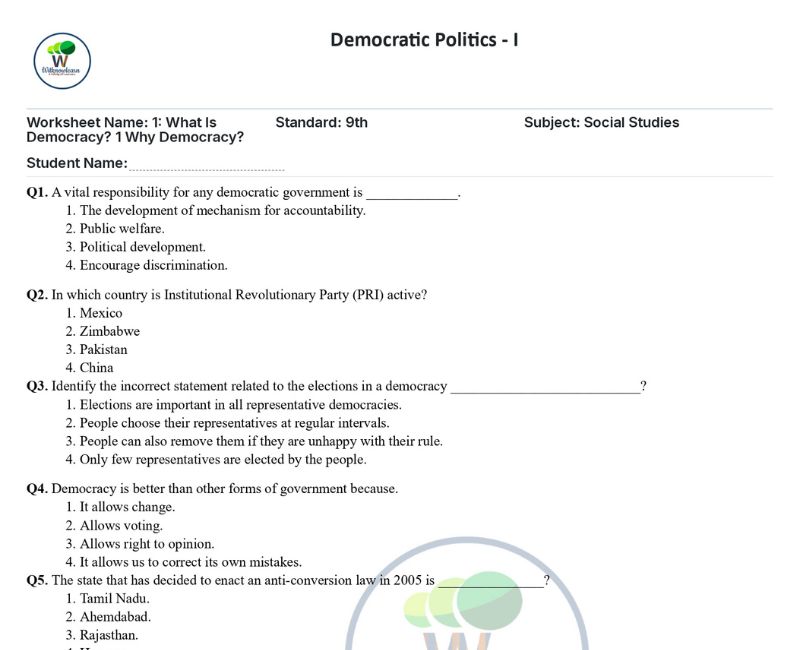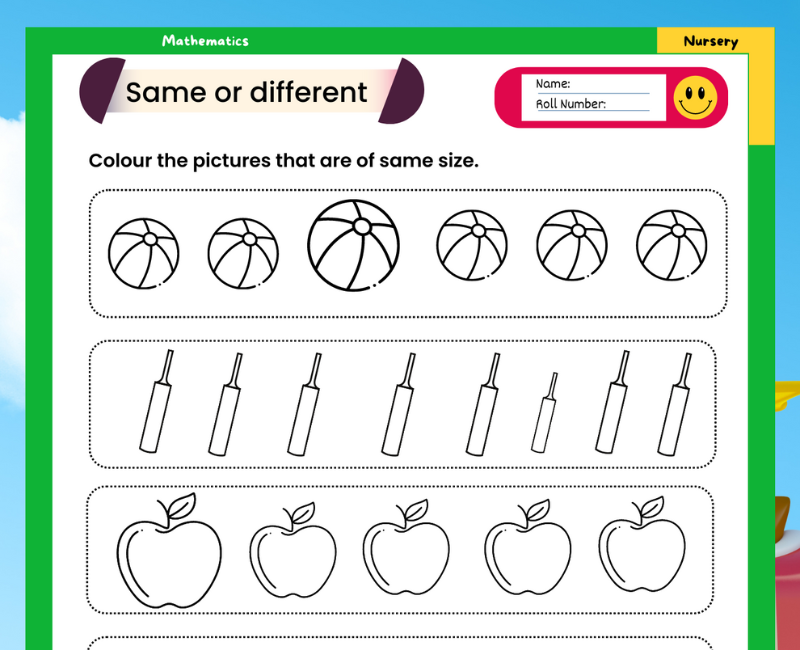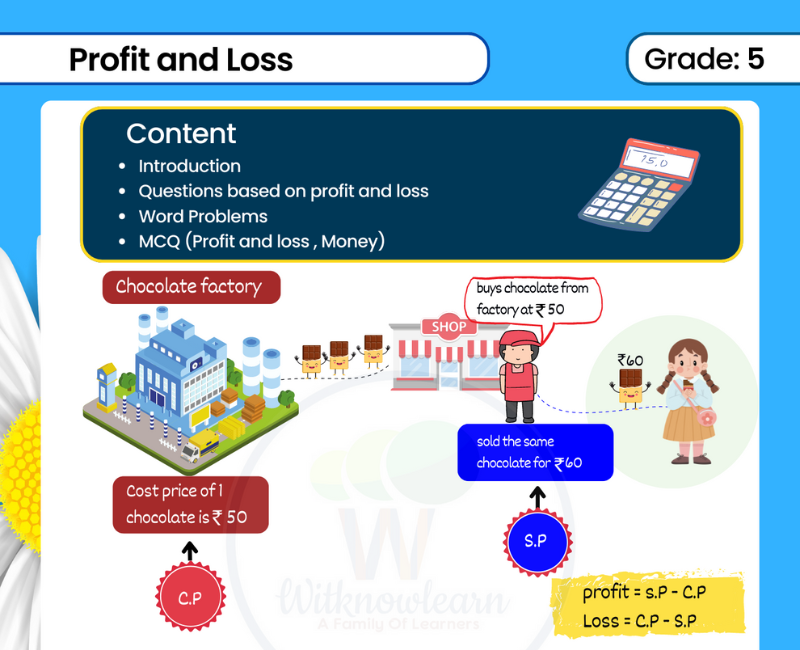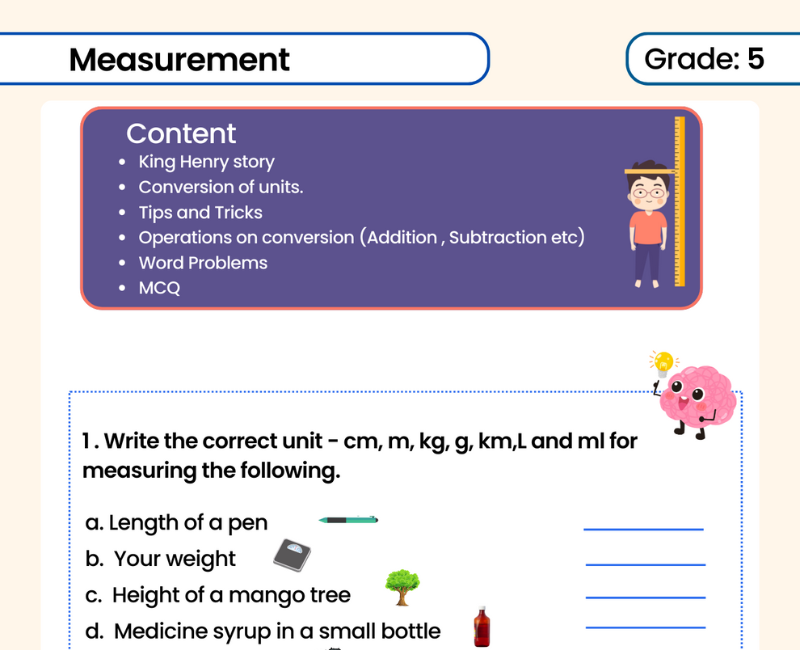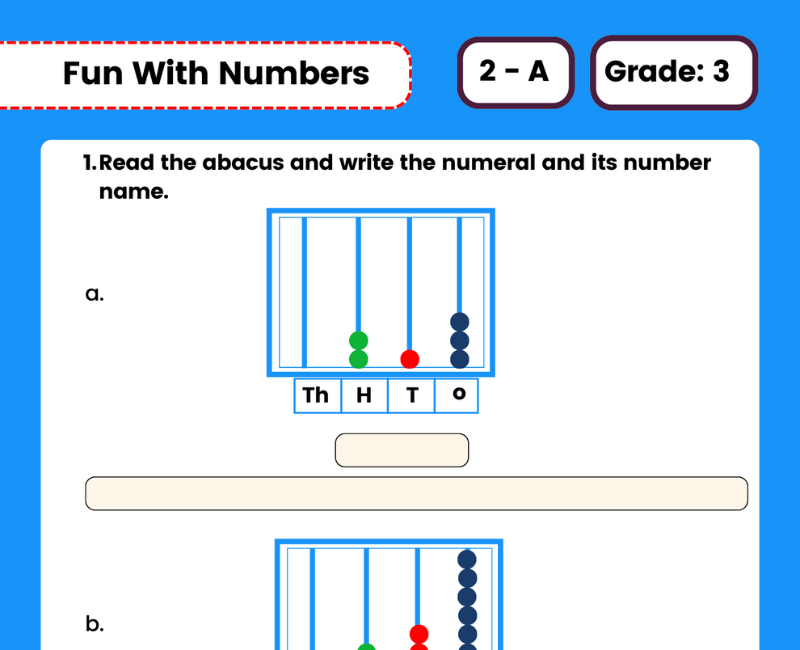What Is Democracy Why Democracy Class 9 Worksheet With Answer
When we dive into the transformative world of civics in Class 9, one of the most compelling chapters we encounter is What is Democracy? Why Democracy? This chapter unfolds as a fascinating journey, exploring not just the framework of democracy but its soul as well. Every student embarks on this voyage with curiosity - curiosity about how societies make decisions, govern their people, and ensure that every voice has the potential to be heard. What is Democracy? Why Democracy? is not just a chapter; it's a conversation starter, laying down the critical framework for understanding why democracies thrive in nurturing freedom, equality, and justice.
The lessons start by addressing foundational questions - What exactly is democracy? And why do we need or choose democracy over other forms of government? Through engaging narratives and insightful discussions, Class 9 students are encouraged to probe into the essence of democratic governments, contrasting them with alternatives to appreciate the value of democratic principles deeply.
The What is Democracy? Why Democracy? worksheet with answers, available for students, serves as an excellent tool to test and apply their knowledge. This hands-on resource deepens their understanding through practical questions, offering definitive answers that clarify complex concepts. Similarly, the worksheet tailored for this chapter in Class 9 not only reinforces learning objectives but stimulates critical thinking about democratic practices globally and locally.
Diving further into the subject, the notes on What is Democracy? Why Democracy? are meticulously crafted to provide students with a robust summary of the chapter. These notes are a gateway to revisiting the pivotal elements of democracy, aiding in a quick recap before exams or class discussions. The addition of MCQs (Multiple Choice Questions) serves as an effective revisory mechanism, challenging students to recall facts, understand democratic values, and appreciate the nuances of democratic structures.
Moreover, the inclusion of important questions and mind maps enriches students' learning experience, offering a panoramic view of democracy’s foundational principles and operational challenges. The MCQs with answers, alongside extra questions and answers, ensure that every learner is equipped with the knowledge and analytical skills to assess democratic institutions critically.
For an interactive exploration, What is Democracy? Why Democracy? also utilizes picture-based questions, turning the learning process into an engaging visual quest. These unique elements capture the essence of democracy in action, making the theoretical aspects of democracy tangible and relatable.
Embarking on Chapter 1 of Civics in Class 9, students not just learn about democracy as a form of government but are invited to ponder its significance in nurturing an equitable, free, and just society. This chapter is not just academic content; it's a narrative that inspires students to value democratic ideals and question how these ideals manifest in different contexts. Through What is Democracy? Why Democracy? young minds learn to appreciate the complexities, challenges, and the unparalleled power of democratic governance.
What is Democracy Why Democracy Class 9
class 9 What is Democracy Why Democracy chapter is an insightful exploration into the ideology and functionality of democracies around the world. This foundational entry in the ninth-grade civics syllabus unpacks the key tenets of democratic systems—highlighting their emphasis on rule by the people, free and fair elections, and respect for rights and freedoms. By examining various democratic structures, students are encouraged to appreciate the value of deliberation, dissent, and majority rule, while also recognizing the pitfalls and challenges of real-world democratic governance.
What is Democracy Why Democracy class 9th – Chapter Overview
The comprehensive overview offered by the What is Democracy Why Democracy class 9th allows students to engage with democratic theory and practice. The content serves as a broad introduction to democracy’s defining features, like accountability, transparency, and equal participation. It sets the stage by comparing democracies to alternative governmental systems, thereby underscoring the importance and desirability of democratic governance. Students begin to learn how democracies shape civil life through a framework that respects the voice of every individual.
What is Democracy Why Democracy class 9 worksheet with answers
What is Democracy Why Democracy worksheet for class 9, furnished with answers, provides a solid evaluative platform for students. The worksheet poses thought-provoking questions directly from the chapter, enabling learners to test their comprehension and opinions on democracy. As students work through the sheet—and check their responses—they strengthen their grasp on subject material and refine their analytical skills, making it a collaborative and self-reflective study aid.
What is Democracy Why Democracy notes class 9
Curated notes for the "What is Democracy Why Democracy" segment in Class 9 summarise the chapter’s key points in a concise and readable format. These notes act as a reference guide that covers the principles and complexities of democracies. Essential for exam preparation and quick revisions, the notes break down complex ideas into accessible chunks, aiding memory retention and making study sessions more efficient.
What is Democracy Why Democracy important questions
Important questions pertaining to What is Democracy Why Democracy target the crux of Class 9 civics content, challenging students to delve deeper into the chapter’s essence. These questions expect learners to articulate the roles and responsibilities within democracies and explain the significance of democratic processes. Engaging with these inquiries enables students to consolidate their learning and display their ability to interpret and argue points critical to democratic theory and practice.
What is Democracy Why Democracy mind map
A mind map for What is Democracy Why Democracy visually connects concepts covered in the class 9 civics chapter. This representation details the interplay between core democratic principles, reasoning, and functions. It serves as an innovative educational tool to help students visualize and memorize the content structure, making complex connections clearer and studying more interactive.
What is Democracy Why Democracy class 9 MCQ with answers
The Multiple Choice Questions (MCQs) for What is Democracy Why Democracy come with answers to facilitate self-assessment for Class 9 students. Tackling these queries allows learners to test their knowledge in a straightforward, objective manner. The MCQs cover a wide range of topics from the chapter, ensuring a thorough review of concepts, and the provided answers give immediate feedback on students' understanding.
What is Democracy Why Democracy class 9 extra questions and answers
Extra questions and answers for the What is Democracy Why Democracy portion in class 9 appeal to students’ curiosity and investigative skills. These additional materials prompt deeper engagement with the chapter by asking students to consider democracy from alternative angles and real-life applications. As a result, they gain a richer and more nuanced view of how democracies operate and evolve.
Important questions from what is democracy why democracy
Identifying important questions from the What is Democracy Why Democracy class 9 chapter helps students pinpoint and prioritize essential content for study and assessment preparation. These questions encapsulate the central themes of the chapter, encouraging rigorous review and ensuring learners have engaged with the most significant and exam-relevant materials. It's a strategic approach to deepen comprehension and elevate academic performance.
What is Democracy Why Democracy class 9 picture based questions
Picture-based questions for What is Democracy Why Democracy in class 9 offer a dynamic entry point for understanding democratic concepts. These visually oriented queries present democracy in a more tangible and relatable way, challenging students to analyze images that depict democratic action or principles. Such an innovative method enhances critical thinking and provides a diverse angle on how democracies might be represented or challenged in everyday scenarios.
